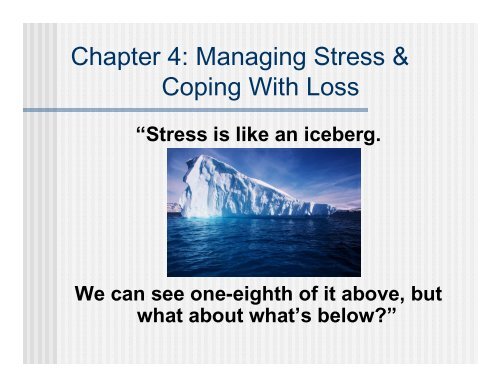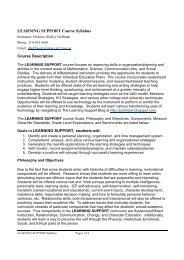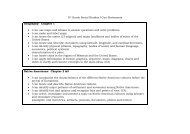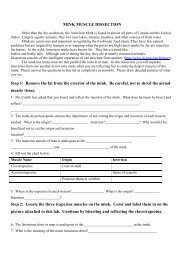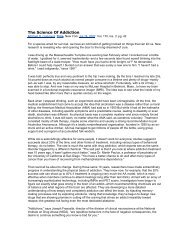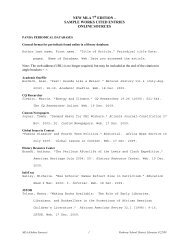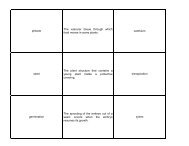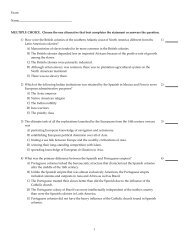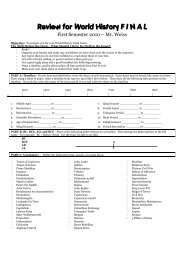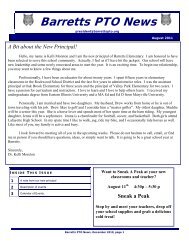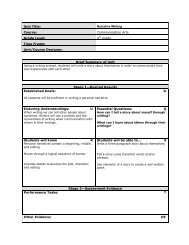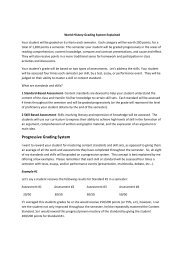Chapter 4: managing stress & coping with loss - this page
Chapter 4: managing stress & coping with loss - this page
Chapter 4: managing stress & coping with loss - this page
Create successful ePaper yourself
Turn your PDF publications into a flip-book with our unique Google optimized e-Paper software.
<strong>Chapter</strong> 4: Managing Stress &<br />
Coping With Loss<br />
“Stress is like an iceberg.<br />
We can see one-eighth of it above, but<br />
what about what’s below?”
Something to consider . . .<br />
The Japanese eat very little fat & . . .<br />
The Mexicans eat a lot of fat & . . .<br />
The Italians drink a lot of red wine & . . .<br />
The Chinese drink very little red wine & . . .<br />
The Germans drink a lot of beer and eat lots of<br />
sausage and fats & . . .<br />
The conclusion . . .
What is Stress?<br />
How you think about a challenge<br />
determines whether you will experience<br />
positive or negative <strong>stress</strong>.
Are You Vulnerable to Stress?<br />
Rate yourself worksheet<br />
Find your ‘Life Change’<br />
Index<br />
Apply what you’ve learned<br />
by reading scenarios and<br />
calculating their Life Change<br />
Index
Stressor = anything that causes<br />
<strong>stress</strong>.<br />
1.) Eu<strong>stress</strong> = “good <strong>stress</strong>”<br />
~ pleasant or stimulating form of <strong>stress</strong><br />
~ may push you to excel<br />
2.) Di<strong>stress</strong> = “bad <strong>stress</strong>”<br />
~ caused by something negative or by taking on more <strong>stress</strong> than you can<br />
handle<br />
How you think about a challenge determines whether you will experience<br />
positive or negative <strong>stress</strong>.<br />
How much <strong>stress</strong> you feel depends on your perception of events that cause<br />
<strong>stress</strong> (<strong>stress</strong>ors).<br />
*Do Good Stress vs. Bad Stress Worksheet
5 Kinds of Stressors<br />
1. Biological <strong>stress</strong>ors<br />
Biochemical imbalances, mental or<br />
physical illnesses, disabilities, or injuries<br />
2. Environmental <strong>stress</strong>ors<br />
Poverty, pollution, crowding, noise, or<br />
natural disasters<br />
3. Cognitive or thinking <strong>stress</strong>ors<br />
The way you perceive a situation or<br />
what you expect from it
Kinds of Stressors, cont.<br />
4. Personal behavior <strong>stress</strong>ors<br />
Negative reactions in the body and mind<br />
caused by using tobacco, alcohol, or other<br />
drugs, or not exercising<br />
5. Life situations<br />
Having a relative or pet die, parents who<br />
separate or divorce, or trouble in relationships<br />
<strong>with</strong> peers<br />
*Worksheet
Stressors for Teens<br />
Life<br />
Situations<br />
Environmental<br />
Biological<br />
Cognitive<br />
(Thinking)<br />
Personal<br />
Behavior<br />
School<br />
demands<br />
Unsafe<br />
neighborhood<br />
Changes in<br />
body<br />
Poor selfesteem<br />
Taking on a<br />
busy schedule<br />
Problems<br />
<strong>with</strong> friends<br />
Peer<br />
pressure<br />
Family<br />
problems,<br />
abuse<br />
Media (TV,<br />
magazines,<br />
newspapers,<br />
internet)<br />
Natural disasters<br />
Threat of terrorist<br />
attacks<br />
Illness<br />
Injury<br />
Disability<br />
Personal<br />
appearance<br />
Not fitting in<br />
Relationship<br />
issues<br />
Smoking<br />
Using alcohol<br />
or other drugs<br />
Moving or<br />
changing<br />
schools<br />
War<br />
Global warming<br />
Breaking up<br />
<strong>with</strong> a boy or<br />
girl friend
Body’s Stress Response<br />
<br />
Body systems that are active during a <strong>stress</strong> response:<br />
1. Nervous system (brain)<br />
2. Endocrine system<br />
(glands that secrete hormones)<br />
• Body’s response is<br />
largely involuntary,<br />
or automatic (occur w/o thinking<br />
about it)<br />
.
3 Stages in Stress Response<br />
<br />
Stage 1 - Alarm:<br />
Pupils dilate<br />
Faster heart rate<br />
Rise in blood pressure<br />
Faster respiration rate<br />
Perspiration increases<br />
Digestion slows<br />
Increased blood flow to muscles & brain<br />
Release of blood sugar & fats to provide increased energy<br />
Adrenaline is released into the bloodstream<br />
Muscles tense & tighten, getting ready for action<br />
*Sometimes known as the FIGHT OR FLIGHT response.
Stage 2 - Resistance:<br />
If exposure to a <strong>stress</strong>or<br />
continues, your body adapts<br />
and reacts to the <strong>stress</strong>or.<br />
You may perform at a higher level <strong>with</strong> more<br />
endurance for a brief period.<br />
Stage 3 - Fatigue:<br />
If exposure to <strong>stress</strong> is prolonged, your body<br />
loses its ability to adapt. You begin to tire<br />
and lose the ability to manage other<br />
<strong>stress</strong>ors effectively.<br />
*Worksheet
Negative Effects of Stress<br />
Psychosomatic response = a physical reaction that results<br />
from <strong>stress</strong> rather than from an injury or illness.<br />
A. Increased Muscle Tension<br />
headaches, back-aches, stiff necks<br />
B. Heart Problems<br />
high blood pressure, heart attacks, stroke<br />
C. Digestive Problems<br />
ulcers, diarrhea, nausea<br />
D. Weakened Immune System<br />
colds, flu, infections<br />
E. Other<br />
asthma, hives, menstrual irregularities<br />
*Ongoing <strong>stress</strong> affects all aspects of your health.
Emotional Reactions to Stress<br />
Anxiety<br />
Forgetfulness<br />
Difficulty Concentrating<br />
Frustration<br />
Irritability<br />
Lack of Motivation<br />
Difficulty Making Decisions<br />
Insomnia<br />
*Worksheet
Personality types which are prone<br />
to suffer from <strong>stress</strong>:<br />
A. Poor self-concept<br />
B. Type A Personality<br />
C. Habitual Worriers<br />
D. Perfectionists<br />
E. “Over-achievers”
SOURCES OF STRESS<br />
What are some sources of <strong>stress</strong> in your<br />
life?<br />
______________________<br />
______________________<br />
______________________<br />
______________________<br />
(Identifying what is <strong>stress</strong>ful is 1 st<br />
step in learning how to manage <strong>stress</strong>.)
I usually just try<br />
To tackle one<br />
Day at a time<br />
But lately several days have<br />
attacked me at once!
Negative Coping Strategies<br />
A. Over-the-counter drugs<br />
B. Prescription drugs<br />
C. Withdrawal/Isolation<br />
D. Alcohol<br />
E. Fasting or eating binges<br />
F. Smoking
Positive Coping Strategies<br />
A. Stay Fit<br />
B. Redirect Your Energy<br />
C. Proper Diet<br />
D. Healthy Sleep Habits<br />
E. Set Realistic Goals & Learn to say “No”<br />
F. Think Positive . . . Don’t sweat the small<br />
stuff!
Positive Coping Strategies – cont.<br />
G. Talk about problems<br />
H. Enjoy Life<br />
I. Time Management<br />
J. Relaxation Techniques<br />
Yoga, Tai-Chi, Massage
Never run away from your problems . . .<br />
. . . pedaling is much faster!!!
Staying Healthy<br />
& Building Resiliency<br />
Taking care of your health is essential to<br />
<strong>stress</strong> management.<br />
Get adequate rest<br />
Get regular physical activity<br />
Eat nutritious foods
Being a Resilient Teen<br />
<br />
<br />
What is Resiliency?<br />
<br />
The ability to adapt effectively and recover from disappointment,<br />
difficulty, or crisis<br />
Factors That Affect Resiliency:<br />
<br />
<br />
External Factors<br />
• Family<br />
• School<br />
• Peers<br />
Internal Factors<br />
• Commitment to learning<br />
• Positive Values<br />
• Social Competency<br />
• Positive Identity
Resiliency & Your Protective<br />
Factors<br />
<br />
<br />
<br />
<br />
<br />
<br />
<br />
<br />
What are Protective Factors?<br />
<br />
Conditions that shield individuals from the negative consequences of exposure to risk.<br />
Become involved in extra-curricular activities at school<br />
Make a commitment to learning by reading for pleasure at<br />
least 3 hours per week<br />
Stand up for your beliefs, and refuse to act against your<br />
values<br />
Be honest <strong>with</strong> yourself and others<br />
Resist negative peer pressure, and avoid dangerous<br />
situations<br />
Develop a sense of purpose<br />
Develop a positive outlook about your future
Coping <strong>with</strong> Loss & Grief<br />
Acknowledging a <strong>loss</strong> is one way to help<br />
begin the healing process.<br />
Myth or Fact?<br />
We grieve only deaths.<br />
MYTH! Fact: all <strong>loss</strong>es cause grief.
Expressing Grief<br />
<br />
The Grieving Process<br />
<br />
<br />
<br />
<br />
<br />
<br />
<br />
<br />
Denial or Numbness<br />
Emotional release<br />
Anger<br />
Bargaining<br />
Depression<br />
Remorse<br />
Acceptance<br />
Hope<br />
These feelings are part of <strong>coping</strong>, or dealing successfully<br />
<strong>with</strong> difficult changes in your life.<br />
*Worksheet
Coping <strong>with</strong> Death<br />
Coping <strong>with</strong> death involves receiving and<br />
showing support.<br />
Most people respond to <strong>loss</strong> by mourning.<br />
• Mourning includes talking about the person,<br />
experiencing the pain of the <strong>loss</strong>, and searching<br />
for meaning.<br />
• It may be difficult for some people to move out of<br />
the mourning process. Dwelling on things that<br />
can’t be changed will only add to your hurt.<br />
• Instead, try to think about how the relationship<br />
was positive in your life.<br />
*Worksheet
Showing Empathy<br />
Grieving alone makes the process more<br />
difficult. Friendship and support makes<br />
the process easier.<br />
Help the person recall happy,<br />
positive memories.<br />
Be an empathetic listener.<br />
Don’t rush the grieving process or attempt to<br />
resolve the person’s grief in one day.
Conclusion:<br />
<br />
<br />
<br />
<br />
<br />
What are the five categories<br />
of <strong>stress</strong>ors?<br />
How would trying an activity<br />
for the first time affect your<br />
<strong>stress</strong> level?<br />
Explain how having resiliency can<br />
help you manage your <strong>stress</strong>.<br />
What are 4 examples of <strong>loss</strong> that could cause someone<br />
to experience the grieving process?<br />
Identify the 8 stages of grief and explain what happens<br />
during each stage.
Ch. 4 Textbook Assignment<br />
Pages 108-109<br />
# 1-8<br />
# 14-24
Questions??


